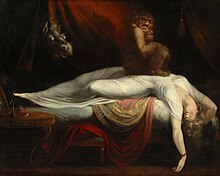Nightmare disorder
Nightmare Disorder Overview: – Signs and Symptoms: – Screaming and yelling during nightmares – Difficulty falling back to sleep – Recurring episodes with intense dream […]
Nightmare Disorder Overview:
– Signs and Symptoms:
– Screaming and yelling during nightmares
– Difficulty falling back to sleep
– Recurring episodes with intense dream recall
– Content of Idiopathic Nightmares:
– Main theme of physical aggression
– Other themes like interpersonal conflict and helplessness
– Fear as the most frequent emotion
– Criteria for Diagnosis:
– Frequent nightmares implying danger
– Impact on personal, social, or professional functioning
– Causes:
– Stress, trauma, and medication side effects
– Associated with PTSD, schizophrenia, and borderline personality disorder
– Epidemiology:
– Affects about 4% of adults
– More prevalent in women
– Common in PTSD patients and children aged 6-10
Consequences and Impacts of Nightmare Disorder:
– Affects various aspects of life including mood, cognition, and behavior
– Can lead to sleep deprivation, fatigue, and insomnia
– Negative impact on sleep, cognitive, and emotional functioning
– Bed partners may also be affected
– Impairs quality of life
Treatment Approaches for Nightmare Disorder:
– Stress reduction techniques like yoga, meditation, and exercise
– Cognitive-behavioral therapy (CBT)
– Eye Movement Desensitization and Reprocessing (EMDR)
– Pharmacological treatments like Prazosin, benzodiazepines, and atypical antipsychotics
– Lucid dreaming treatment and imagery rehearsal therapy
Research and Studies on Nightmare Disorder:
– Dissociative disorders and borderline personality disorder associations
– Hypnosis as a potential treatment
– Lower cholesterol levels linked to nightmare disorder
– Ongoing research for new treatment options
– Thematic and content analysis of nightmares
Professional Recommendations and External Links:
– Position papers and guidelines for nightmare disorder treatment
– Classification in ICD-10 and ICD-9-CM
– Studies on nightmare disorder in different patient populations
– Best practice guides for treating nightmare disorder
– Relationship between nightmare disorder and dissociative disorders
Nightmare disorder is a sleep disorder characterized by repeated intense nightmares that most often center on threats to physical safety and security. The nightmares usually occur during the REM stage of sleep, and the person who experiences the nightmares typically remembers them well upon waking. More specifically, nightmare disorder is a type of parasomnia, a subset of sleep disorders categorized by abnormal movement or behavior or verbal actions during sleep or shortly before or after. Other parasomnias include sleepwalking, sleep terrors, bedwetting, and sleep paralysis.
| Nightmare disorder | |
|---|---|
 | |
| The Nightmare, by Johann Heinrich Füssli | |
| Specialty | Psychiatry |
| Frequency | c. 4% |
Nightmare disorders can be confused with sleep terror disorders. The difference is that after a sleep terror episode, the patient wakes up with more dramatic symptoms than with a nightmare disorder, such as screaming and crying. Furthermore, they do not remember the reason of the fear, while a patient with a nightmare disorder remembers every detail of the dream. Finally, the sleep terrors usually occur during NREM Sleep.
Nightmares also have to be distinguished from bad dreams, which are less emotionally intense. Furthermore, nightmares contain more scenes of aggression than bad dreams and more unhappy endings. Finally, people experiencing nightmares feel more fear than with bad dreams.
The treatment depends on whether or not there is a comorbid PTSD diagnosis. About 4% of American adults are affected. Studies examining nightmare disorders have found that the prevalence rates ranges 2–6% with the prevalence being similar in the US, Canada, France, Iceland, Sweden, Belgium, Finland, Austria, Japan, and the Middle East.